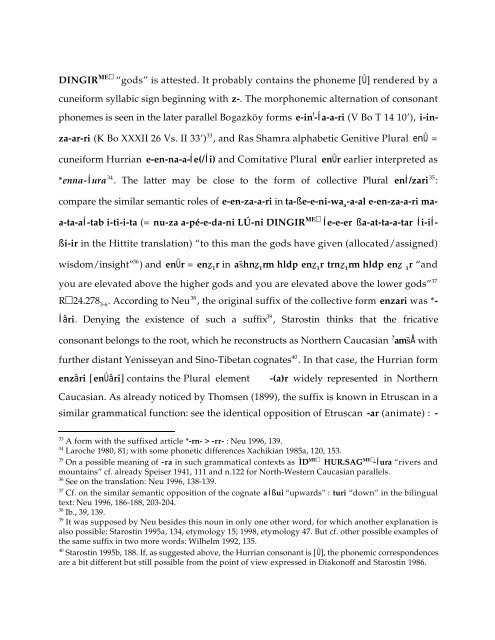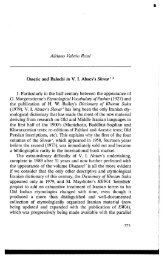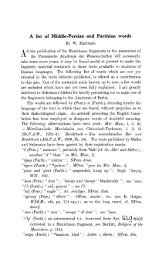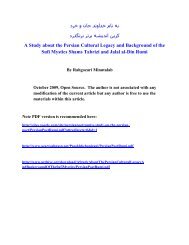Comparative Notes on Hurro-Urartian, Northern Caucasian
Comparative Notes on Hurro-Urartian, Northern Caucasian
Comparative Notes on Hurro-Urartian, Northern Caucasian
Create successful ePaper yourself
Turn your PDF publications into a flip-book with our unique Google optimized e-Paper software.
DINGIR “gods” is attested. It probably c<strong>on</strong>tains the ph<strong>on</strong>eme [Û] rendered by a<br />
cuneiform syllabic sign beginning with z-. The morph<strong>on</strong>emic alternati<strong>on</strong> of c<strong>on</strong>s<strong>on</strong>ant<br />
ph<strong>on</strong>emes is seen in the later parallel Bo azköy forms e-in ! -Ía-a-ri (V Bo T 14 10’), i-in-<br />
za-ar-ri (K Bo XXXII 26 Vs. II 33’) 33 , and Ras Shamra alphabetic Genitive Plural enÛ =<br />
cuneiform Hurrian e-en-na-a-Íe(/Íi) and Comitative Plural enÛr earlier interpreted as<br />
*enna-Íura 34 . The latter may be close to the form of collective Plural enÍ/zari 35 :<br />
compare the similar semantic roles of e-en-za-a-ri in ta-ße-e-ni-wa a -a-al e-en-za-a-ri ma-<br />
a-ta-aÍ-tab i-ti-i-ta (= nu-za a-pé-e-da-ni LÚ-ni DINGIR Íe-e-er ßa-at-ta-a-tar Íi-iÍ-<br />
ßi-ir in the Hittite translati<strong>on</strong>) “to this man the gods have given (allocated/assigned)<br />
wisdom/insight” 36 ) and enÛr = enz= 1r in as#hnz= 1rm hldp enz= 1r trnz= 1rm hldp enz= 1r “and<br />
you are elevated above the higher gods and you are elevated above the lower gods” 37<br />
R 24.278 3-6 . According to Neu 38 , the original suffix of the collective form enzari was *-<br />
Íâri. Denying the existence of such a suffix 39 , Starostin thinks that the fricative<br />
c<strong>on</strong>s<strong>on</strong>ant bel<strong>on</strong>gs to the root, which he rec<strong>on</strong>structs as <strong>Northern</strong> <strong>Caucasian</strong> ? ams#Å with<br />
further distant Yenisseyan and Sino-Tibetan cognates 40 . In that case, the Hurrian form<br />
enzâri [enÛâri] c<strong>on</strong>tains the Plural element -(a)r widely represented in <strong>Northern</strong><br />
<strong>Caucasian</strong>. As already noticed by Thomsen (1899), the suffix is known in Etruscan in a<br />
similar grammatical functi<strong>on</strong>: see the identical oppositi<strong>on</strong> of Etruscan -ar (animate) : -<br />
33 A form with the suffixed article *-rn- > -rr- : Neu 1996, 139.<br />
34 Laroche 1980, 81; with some ph<strong>on</strong>etic differences Xachikian 1985a, 120, 153.<br />
35 On a possible meaning of -ra in such grammatical c<strong>on</strong>texts as ÌD HUR.SAG -Íura “rivers and<br />
mountains” cf. already Speiser 1941, 111 and n.122 for North-Western <strong>Caucasian</strong> parallels.<br />
36 See <strong>on</strong> the translati<strong>on</strong>: Neu 1996, 138-139.<br />
37 Cf. <strong>on</strong> the similar semantic oppositi<strong>on</strong> of the cognate aÍßui “upwards” : turi “down” in the bilingual<br />
text: Neu 1996, 186-188, 203-204.<br />
38 Ib., 39, 139.<br />
39 It was supposed by Neu besides this noun in <strong>on</strong>ly <strong>on</strong>e other word, for which another explanati<strong>on</strong> is<br />
also possible: Starostin 1995a, 134, etymology 15; 1998, etymology 47. But cf. other possible examples of<br />
the same suffix in two more words: Wilhelm 1992, 135.<br />
40 Starostin 1995b, 188. If, as suggested above, the Hurrian c<strong>on</strong>s<strong>on</strong>ant is [Û], the ph<strong>on</strong>emic corresp<strong>on</strong>dences<br />
are a bit different but still possible from the point of view expressed in Diak<strong>on</strong>off and Starostin 1986.





